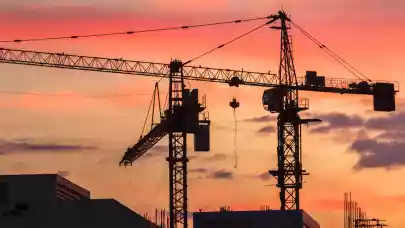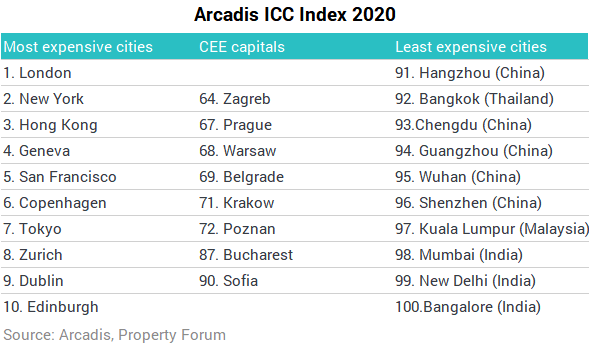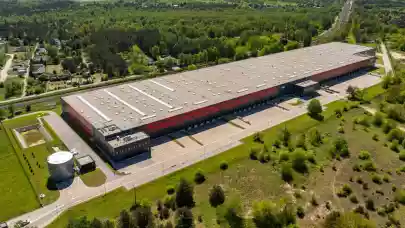
Arcadis published the annual results of the international construction costs comparison (International Construction Costs 2020). Arcadis ICC Index 2020 monitors 100 cities around the world, assessing their construction costs and market conditions. This year's study also includes an insight into the construction industry in view of the current coronavirus pandemic and the ongoing climate change. According to the ICC Index 2020, Prague has higher construction costs in the CEE region than Warsaw (Poland), Belgrade (Serbia), Bucharest (Romania) and Sofia (Bulgaria), but lower than Zagreb (Croatia).
Worldwide comparison:
- After a successful 2018, the annual International Construction Cost index in 2019 recorded a worldwide slowdown in construction activity.
- An outbreak of the coronavirus pandemic in early 2020 will lead to a decline in construction activity. The construction industry will be confronted with limitation/interruption of construction work, construction supply and workforce cuts due to the border closure
- The pandemic will also delay the structural change of the whole sector in relation to adaptation to climate change.
Czech Republic:
- All construction segments in the Czech Republic have experienced a boom since 2015, accompanied by a rapid increase in construction work prices (material and wages) between 2015 and 2018. In 2019, price growth has stopped and will remain at this level, thanks to long-term contracts, this year.
- Prague ranked 67th in the international comparison of construction costs. From the CEE perspective, Prague remains behind Zagreb (64th place). Lower construction costs are within the region in Warsaw (68th place), Belgrade (69th place), Bucharest (87th place) and Sofia (90th place).
- At present (beginning of April 2020), contracted construction projects in the Czech Republic for this year are carried out under increased hygiene measures. Due to sudden changes in supplies, the capacities of domestic suppliers of building materials are fully utilized.
- Prague, respectively the Czech Republic, has the highest number of internationally certified buildings (LEED and BREEAM certifications) within the CEE.
Within the annual ICC Index of International Construction Costs, Western European cities have long been at the forefront. In ICC 2020, there are six of them in the top ten. These are the British cities of London and Edinburgh, the Swiss cities of Geneva and Zurich, the Danish Copenhagen and the Irish Dublin. Asian cities have the lowest construction costs - in India, China, Malaysia and Thailand, which is reflected in construction activity there.

Within the cities monitored in the CEE region, Prague ranked behind Zagreb. The Polish cities of Warsaw, Krakow and Poznan and Belgrade are closely followed, whereas Bucharest and Sofia follow with distance.
“The growth of construction costs in recent years in the Czech Republic was driven mainly by wage growth (which was even higher than in the West), limited capacity of construction companies and short-term lack of certain types of building materials. In 2019, the costs of building materials, in my opinion, reached the maximum at which they will remain - due to long-term contracts - this year,” says Milan Vencl, Cost Consultant at Arcadis.
Impact of the COVID-19 pandemic on construction
According to the ICC 2020 study, there are two main ways COVID-19 can affect construction. First and foremost, there may be a supply shock, where development and construction projects slow down, delay or stop completely due to a lack of building materials and technology units, or lack of construction workers. The second danger is a drop in demand due to a possible economic recession.
“To date, major construction projects in the Czech Republic are underway and everyone is trying to minimize delays to a minimum. However, we observe outages for both foreign workers and supplies of construction materials from abroad (eg popular Italian tiles). Czech companies are doing their best to keep their commitments. Unfortunately, we are not able to predict further developments at the moment, but we can add that the situation will directly depend on the extent and length of government restrictions not only in our country but also in surrounding countries,” adds Josef Kalabis from Arcadis.
Adaptation of construction to climate change
Being responsible for nearly 12% of global CO2 emissions, construction contributes significantly to global warming. Despite this fact, for example, it is significantly lagging behind in adaptation to climate change compared to the automotive industry. In Europe, the drivers of structural change are the requirements of European legislation, real estate investors and public opinion (emphasis on sustainable business).
"The only advantage of the current pandemic is the decline in greenhouse gas emissions worldwide," says Andrew Beard, Head of Global Cost Management Team at Arcadis, adding that the current pandemic is likely to push climate change solutions to the ground to keep national economies running "In the long run, the climate crisis is an even bigger challenge that we have to tackle."
The good news is that within the CEE region, the Czech Republic is the country with the highest number of commercial real estate with environmental certification LEED or BREEAM. Arcadis participated in the certification of 100 buildings from less than 200 complexes. The Czech branch of Arcadis was also entrusted with the certification of CTP's industrial portfolio, which includes 293 assets across the CEE region.



